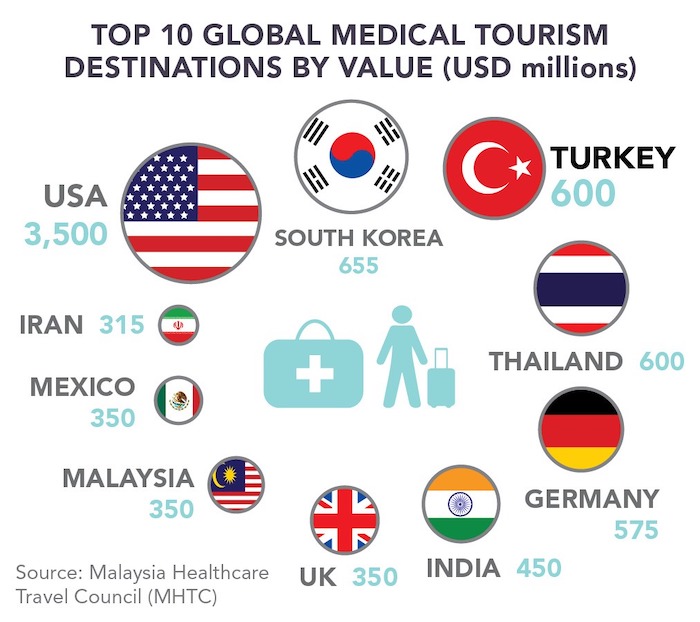england times- Health tourism also known as medical tourism or medical travel refers to the practice of traveling to a different country or region to receive medical treatment or undergo medical procedures. The success of health tourism can vary depending on several factors. In recent years health tourism has been growing in popularity due to various reasons such as cost savings, access to high quality medical care, reduced waiting times, availability of specialized treatments and the opportunity to combine medical procedures with vacation or leisure activities.
Health tourism international patients
Many countries have actively promoted health tourism and developed specialized facilities to cater to international patients. Destinations such as India, Thailand, Singapore, Turkey, Mexico and Costa Rica have emerged as popular choices for medical travelers. These countries often offer competitive prices, state of the art medical facilities, well trained healthcare professionals and favorable exchange rates, making them attractive options for individuals seeking medical treatments.
However, the success of health tourism is not universal across all destinations or medical procedures.
Factors that can influence its success include
Quality of healthcare facilities and services
The success of health tourism depends on the availability of high quality medical facilities and well trained healthcare professionals. Patients are more likely to choose destinations that have a reputation for excellence in specific medical fields.
Regulatory standards
Countries with stringent regulatory standards for healthcare such as accreditation of hospitals and clinics, tend to attract more medical tourists. These standards ensure patient safety and quality of care.
Cost effectiveness
Cost is often a significant factor for individuals considering health tourism. Countries that offer competitive pricing compared to the patient's home country without compromising on quality are more likely to succeed in attracting medical tourists.
Accessibility and infrastructure
Good transportation links, visa processes and overall infrastructure play a crucial role in the success of health tourism. Ease of travel and a supportive environment can significantly impact a patient's decision to choose a particular destination.
Reputation and trust
Positive word of mouth, testimonials and a track record of successful outcomes help build trust and attract more medical tourists. Countries that have established themselves as reliable and safe destinations tend to have greater success.
It's important to note that health tourism also has its challenges, including potential language barriers, different cultural practices, varying legal and ethical frameworks and the need for post treatment follow up. However, with proper planning, coordination and communication, health tourism can be successful in providing patients with quality medical care and satisfying their needs.

What is the most common health tourism problems ?
While health tourism can offer many benefits, there are several common problems or challenges associated with this practice.
These include
Quality and Safety Concerns
One of the primary concerns with health tourism is ensuring the quality and safety of medical treatments. Patients may face challenges in verifying the credentials and reputation of healthcare providers and facilities in foreign countries. Variation in healthcare standards, lack of standardized regulations and potential language barriers can pose risks to patient safety.
Follow up Care and Continuity
After undergoing medical procedures or treatments abroad, patients may face difficulties in receiving proper follow up care and continuity of treatment once they return to their home country. Communication gaps between healthcare providers in different countries can result in challenges in managing post treatment care and addressing any complications that may arise.
Legal and Ethical Differences
Different countries have varying legal and ethical frameworks when it comes to healthcare. Patients traveling for medical treatments may encounter differences in medical practices, regulations and patient rights, which can lead to confusion and potential ethical dilemmas.
Language and Cultural Barriers
Language and cultural differences can create communication challenges between patients and healthcare providers. Misunderstandings and misinterpretations of medical information may occur, affecting the patient's overall experience and quality of care.
Travel related Risks
Traveling for medical purposes involves logistical considerations, such as transportation, accommodation and visa requirements. Patients may face risks associated with long distance travel, including fatigue, jet lag and the potential for complications during or after travel.
Lack of Insurance Coverage
Depending on the patient's home country and insurance coverage, medical treatments received abroad may not be covered, resulting in significant out of pocket expenses. Understanding insurance coverage and reimbursement policies is crucial to avoid unexpected financial burdens.
Ethical Concerns and Exploitation
Health tourism can raise ethical concerns related to the exploitation of vulnerable populations, organ trafficking or substandard practices. Patients need to be cautious and conduct thorough research to ensure they are receiving treatment from reputable and ethical healthcare providers.
It is important for individuals considering health tourism to thoroughly research their chosen destination, healthcare providers and associated risks. Seeking advice from healthcare professionals, contacting reputable medical tourism facilitators and considering testimonials also reviews from previous patients can help mitigate potential problems and ensure a safe positive health tourism experience.

The UK has a well regarded healthcare system
UK has the National Health Service (NHS) which provides healthcare services to residents. However, there are instances where individuals from other countries may seek medical treatment in the UK.
Either due to the reputation of UK healthcare professionals, specific treatments offered or a desire for access to advanced medical technologies.
Health tourism can bring economic benefits to a country such as revenue from medical treatments, accommodation and related services. It can also contribute to the exchange of medical knowledge and expertise.
There can be challenges and considerations associated with health tourism, including capacity constraints within the healthcare system, potential strain on resources and ethical concerns.
The UK government has implemented measures to regulate health tourism, aiming to strike a balance between supporting medical tourism and ensuring the availability of healthcare services for residents. These measures include charging overseas visitors for non urgent NHS treatment with exceptions for certain vulnerable groups.
To assess the success of health tourism in the UK.
One would need to consider factors such as the number of individuals seeking treatment the economic impact, patient satisfaction and the overall impact on the healthcare system. Detailed research and up to date data would be required to provide a comprehensive evaluation.
If you're seeking specific information or statistics on the success of health tourism in the UK, england times recommend referring to official government reports, research papers or consulting with relevant healthcare organizations or experts who have access to the latest data and insights.



